2004: The Year in Review, Part 3
The death of Acclaim, suspicious EA activity, Ballmer and Iwata up the next-gen ante, murder by PlayStation, trade shows in London, Tokyo and more in our look at Q3.
[Part 1] [Part 2] [Part 3] [Part 4]
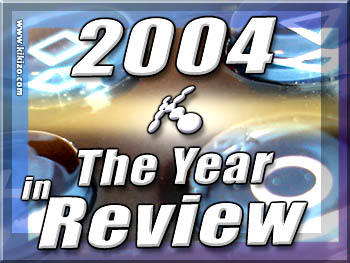
Part 3
If the first half of the year is when companies announce their wares, it's the run up to Christmas where games start to flood the market. This year several of the biggest franchises in the industry today all saw new entries.
In July, Gary Cooper, an analyst at Banc America Securities, predicted that the industry would "witness the largest sales of video games in any six-month period in the history of the video game industry."
And with Grand Theft Auto: San Andreas, Halo 2, Half-Life 2 and many more on track for release in the last half of the year, few would disagree with Cooper's optimism.
Acclaim Bows Out
It wasn't good news for everyone in the industry, though. Acclaim, publisher of the successful Burnout series and originator of sometimes-kooky advertising campaigns, warned in the middle of the year that it was running out of cash and without a rapid infusion, bankruptcy was a distinct possibility.
Shortly after this, the company lost both the Turok and MLB baseball franchises. And then the hammer fell.
Games juggernaut EA bought Criterion, the developer of the Burnout games, at the end of July, dealing a critical blow to Acclaim. With most of its major franchises gone, the death of Acclaim at the end of August was a given.
EA Snaps Up Middleware Creator
EA's purchase of Criterion was bad for Acclaim, but the industry as a whole gasped at the deal's announcement too. In addition to working on popular series like Burnout, Criterion also created Renderware, one of the most popular middleware software platforms in the industry.
 Controversially, EA also snapped up Criterion, the company that develops the Renderware technology behind games like GTA
Controversially, EA also snapped up Criterion, the company that develops the Renderware technology behind games like GTAMiddleware gives developers a base of graphics and other components to build their games on, allowing them to avoid working on solved problems. The proximity of the next generation of videogame hardware means that middleware is will be more important in the future.
Renderware is already widely used, with games like the Grand Theft Auto series using it as a starting point. With EA now in the owner's seat, many game creators were worried that it would be more difficult for them to make games. But EA and Criterion assured the industry that they were not interested in monopolising the popular middleware platform.
Nintendo Still Not a Fan of Online
Despite a general consensus that online games are destined to be a large part of the console videogame business, Nintendo has avoided that particular bandwagon. Nintendo's president, Satoru Iwata, reiterated his company's hostility towards online gaming in July, saying that, "customers do not want online games".
Iwata cited the difficulty of turning the online play into revenue and said that companies' enthusiasm was "cooling". The company's new handheld, the Nintendo DS, does however support wireless multiplayer, though at the moment it's relegated to closed quarters.
Nintendo's Reggie Fils-Amie did state at Nintendo's pre-show meeting at May's Electronic Entertainment Expo that online play is a possibility, so Nintendo may be on the brink of a change of heart.
Microsoft Eyes Sony
With the company having overtaken Nintendo for the second spot in the hardware market, Microsoft next turned to Sony. After a so-so start back in 2001, Microsoft has done well to engender support from both hardcore and casual gamers alike, and the company feels it has what it will take to knock Sony from its leading position.
Steve Ballmer, Microsoft's ebullient CEO, pointed out that while the Xbox division is still running at a loss, the console has gone from obscurity to second place in just a few years. "We can take Sony in the next generation. I am betting we can take Sony in the next generation," Ballmer told a US technology news site in July.
Quite when that showdown will be is still anyone's guess though. Ballmer said in a separate interview that Microsoft would not release the successor to the Xbox in 2005.
Pro Evo Goes Online
One of Microsoft's biggest coups was to get Konami's Pro Evolution Soccer 4 on Xbox. Even better, the game would be online on Xbox only, leaving PlayStation 2 owners isolated in their gaming rooms.
Sony did have the advantage of a month's head start, but the lack of online play and poorer graphics than on Xbox surely dented sales of the PlayStation 2 version.
Gamers Killing Gamers
"Murder By PlayStation" read the headline of the Daily Mirror in late July after a 17-year-old British boy viciously killed his 14-year-old friend. According to the victim's parents, the accused had been playing Rockstar's controversial 18-rated title Manhunt before the murder.
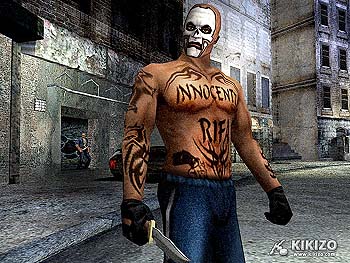 Manhunt was short-sightedly blamed for a UK murder
Manhunt was short-sightedly blamed for a UK murderBut the finding of a copy of the game at the victim's house confused matters - even for those gung-ho on slapping the videogame industry's wrist. The Government took the matter seriously, though, and by the end of the year there was an overview of the UK's videogame rating system.
Clash of the UK Game Shows
For over a decade the European Computer Trade Show (ECTS) has been the place to be to see what's what in the UK videogame scene, but that changed in 2004 with the debut of Game Stars Live, a publicly accessible showcase of current and upcoming releases.
 ExCel was full of totty for the first EGN show
ExCel was full of totty for the first EGN showTens of thousands of gamers flocked to London's Docklands region to taste unreleased titles like Metroid Prime 2: Echoes, Pro Evolution Soccer 4 and Halo 2. Game Stars Live did well in its opening year; enough so to bring into doubt the future of ECTS.
Games Industry Rolls into Japan
The days of Japan being the videogame powerhouse may be behind us, but there's still a lot to be excited about coming out of the country. In September, attention veered eastward to the Tokyo Game Show, where publishers showed off their current cautious approach with sequel upon sequel.
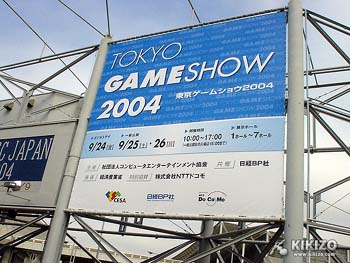 MGS3 and GT4 continued to impress at TGS
MGS3 and GT4 continued to impress at TGSTo be fair, when the games in question include the likes of Gran Turismo 4, Final Fantasy XII and Metal Gear Solid 3: Snake Eater, this isn't necessarily a bad thing, but the decline of the original concept was evident to all. Nintendo skipped the event again, opting instead to show off the Nintendo DS in its own roaming showcase.
Nearly 160,000 gamers streamed through the gates of the Makuhari Messe convention centre over the three days of TGS, 10,000 more than last year, showing that while the Japanese videogame industry might be in decline, the gamers are still there.
2004's Big Games Start Coming In
The videogame industry is notoriously cyclical, and it's in the second half of the year that the majority of games are released, culminating in a final pre-Christmas rush. Games often get lost in the shuffle, but that was not a fate to befall the UK-developed Fable. The action RPG, which spent four years in development, proved well worth the wait, and it became the fastest selling Xbox games of all time.
Sudeki, another Xbox-exclusive RPG, didn't get off that easily and received middling reviews and little fanfare at the tills. Sales of Manhunt took off after the furore surrounding the earlier murder, proving again that there's not such thing as bad publicity.
The release of Doom 3 in August coincided with a disturbing trend in 2004 - the piracy of games even before their release. The long-awaited shooter was available for download the day before it hit stores, though the actual damage dealt to sales of the game is hard to gauge.
The Stage is Set
After months of preparation, things were finally in place for the end-of-year feeding frenzy. Watch for Part Four of our year-end feature as we look back on the closing months of 2004.
- Part 1: Winter 2004
- Part 2: Spring 2004
- Part 3: Summer 2004
- Part 4: Autumn 2004
Continue to Rest of Feature:
Kikizo Staff
Are betting next year will be even hotter.

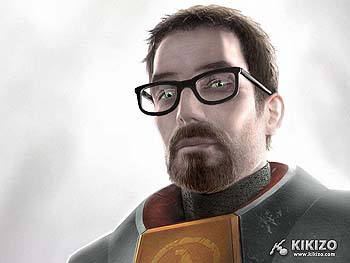
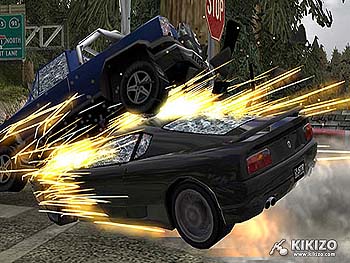

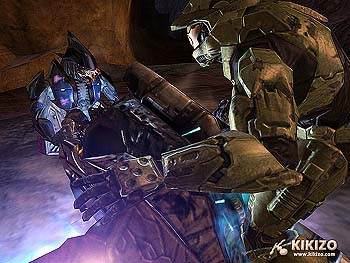
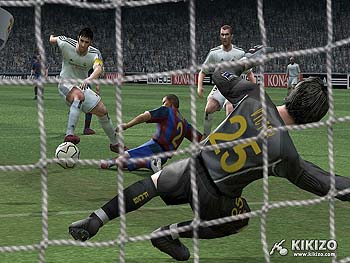
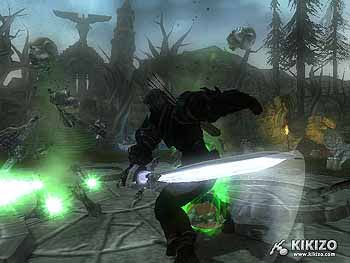




 Satoru Iwata Video Interview - the late Nintendo president spoke with Kikizo in 2004 as 'Nintendo Revolution' loomed.
Satoru Iwata Video Interview - the late Nintendo president spoke with Kikizo in 2004 as 'Nintendo Revolution' loomed. Kaz Hirai Video Interview - the first of Kikizo's interviews with the man who went on to become global head of Sony.
Kaz Hirai Video Interview - the first of Kikizo's interviews with the man who went on to become global head of Sony. Ed Fries Video Interview - one of Xbox's founders discusses an epic journey from Excel to Xbox.
Ed Fries Video Interview - one of Xbox's founders discusses an epic journey from Excel to Xbox. Yu Suzuki, the Kikizo Interview - we spend time with one of gaming's most revered creators.
Yu Suzuki, the Kikizo Interview - we spend time with one of gaming's most revered creators. Tetris - The Making of an Icon: Alexey Pajitnov and Henk Rogers reveal the fascinating story behind Tetris
Tetris - The Making of an Icon: Alexey Pajitnov and Henk Rogers reveal the fascinating story behind Tetris Rare founders, Chris and Tim Stamper - their only interview? Genuinely 'rare' sit down with founders of the legendary studio.
Rare founders, Chris and Tim Stamper - their only interview? Genuinely 'rare' sit down with founders of the legendary studio. The History of First-Person Shooters - a retrospective, from Maze War to Modern Warfare
The History of First-Person Shooters - a retrospective, from Maze War to Modern Warfare